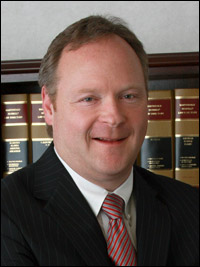Thomas J. Binder
By: WISCONSIN LAW JOURNAL STAFF//May 25, 2009//
 Milwaukee attorney Thomas J. Binder enjoys the courtroom, and finds himself there often. But Binder is only there if it’s the right place to be.
Milwaukee attorney Thomas J. Binder enjoys the courtroom, and finds himself there often. But Binder is only there if it’s the right place to be.
“I try to look at every case from a common-sense, fairness perspective, and to predict what will happen based on the facts, law, medicine or engineering that might be involved in any particular case. I always try to advocate for the most fair and just outcome,” says Binder, of Simpson & Deardorff S.C.
Some cases need to be tried to verdict or taken to the appellate courts, while others need to be settled. Binder thinks that, after almost 23 years as a defense attorney, he is fairly adept at sorting the wheat from the chaff in that regard. In fact, making the initial case evaluation, and then seeing it come to pass in most matters, has become one of the most enjoyable aspects of his job lately.
Binder identifies a number of cases where he’s obtained successful results for his clients, and where he believes the just result was achieved.
Early on in his career, in Malecki v. Fine-Lando Clinic Chartered, 162 Wis. 2d 73, 469 N.W.2d 629 (1991), Binder represented a cardiologist accused of conspiring with a medical clinic to destroy the business of another cardiologist. At trial, the plaintiff prevailed on a claim under an obscure Wisconsin statute regarding civil conspiracy, but Binder was able to argue successfully before both the state appellate courts that the seven-figure verdict should be overturned.
A more recent victory came in Rosario v. Acuity, 2007 WI APP 194, where the Wisconsin Court of Appeals held that a plaintiff could not recover for injuries from a fall based upon an alleged structural defect, due to the 10-year statute of repose. Binder says the very heart of his argument was the idea that it was unfair to impose liability on a third- or fourth-successor property owner, for a defect that occurred in the building’s construction roughly 40 years ago.
The court agreed and extended the coverage of the statute of repose beyond architects and builders to include building owners.
Finally, in Yannaras v. Thomas, a Milwaukee County jury in 2007 agreed with his client that there was insufficient evidence of liability in a chain-reaction rear-end auto accident. The plaintiff was seeking several hundred thousand dollars for spinal injuries, but Binder weakened that claim substantially by introducing evidence that the injuries were pre-existing.
Legal News
- Former law enforcement praise state’s response brief in Steven Avery case
- Eric Toney announces re-election bid for Fond du Lac County District Attorney
- Former Wisconsin Democratic Rep. Peter Barca announces new bid for Congress
- Republicans file lawsuit challenging Evers’s partial vetoes to literacy bill
- More human remains believed those of missing woman wash up on Milwaukee Co. beach
- Vice President Harris returning to Wisconsin for third visit this year
- Wisconsin joins Feds, dozens of states to hold airlines accountable for bad behavior
- Trump ahead of Biden in new Marquette poll
- Bankruptcy court approves Milwaukee Marriott Downtown ‘business as usual’ motion
- New Crime Gun Intelligence Center to launch in Chicago
- Arrest warrant proposed for Minocqua Brewing owner who filed Lawsuit against Town of Minocqua
- Wisconsin Supreme Court justices question how much power Legislature should have
WLJ People
- Power 30 Personal Injury Attorneys – Russell Nicolet
- Power 30 Personal Injury Attorneys – Benjamin Nicolet
- Power 30 Personal Injury Attorneys – Dustin T. Woehl
- Power 30 Personal Injury Attorneys – Katherine Metzger
- Power 30 Personal Injury Attorneys – Joseph Ryan
- Power 30 Personal Injury Attorneys – James M. Ryan
- Power 30 Personal Injury Attorneys – Dana Wachs
- Power 30 Personal Injury Attorneys – Mark L. Thomsen
- Power 30 Personal Injury Attorneys – Matthew Lein
- Power 30 Personal Injury Attorneys – Jeffrey A. Pitman
- Power 30 Personal Injury Attorneys – William Pemberton
- Power 30 Personal Injury Attorneys – Howard S. Sicula





